|
|
|
Sort Order |
|
|
|
Items / Page
|
|
|
|
|
|
|
| Srl | Item |
| 1 |
ID:
151100


|
|
|
|
|
| Summary/Abstract |
Protective policies are essential for individual development and group mobility.
Positive discriminatory efforts seek to reduce group inequalities and to rectify
the consequences of group discrimination. Reservations in the fields of politics,
education and employment aimed at protecting tribal culture and tradition have
achieved strikingly little. Protection of land and life support system has been
poorly implemented. There have been no marked improvements in their social
conditions. Planned intervention has not improved the occupational and educational
levels of tribals. Non-tribals do not treat them equally. Apart from developing
entrepreneurship, follow-up action in providing developmental benefits to
tribals should be made. The single-stroke formula of providing loans and facilities
is unsuited to the development needs of the area. Social capital formation
is needed to ensure justice, or to provide socio-economic justice, which was
traditionally present in the tribal economy and society.
|
|
|
|
|
|
|
|
|
|
|
|
|
|
|
|
| 2 |
ID:
152841
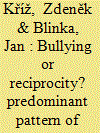

|
|
|
| 3 |
ID:
156083
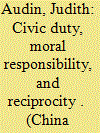

|
|
|
|
|
| Summary/Abstract |
This paper, which is based on ethnographic field research, analyses the system of resident-volunteers in the neighbourhoods of Beijing. Between co-optation networks, surveillance missions, ritualised practices, and ordinary exchanges of sociability amongst neighbours, volunteering is an interesting form of citizen participation in urban China. The volunteer networks are made up of inhabitants who are selected and involved through the norms of civic duty, personal acquaintance, moral obligation, or persuasion, in order to contribute to the production of local public order. Finally, this specific form of voluntarism reveals, from the perspective of retired people, how shared socio-political practices are created and perpetuated within an institutional volunteering system.
|
|
|
|
|
|
|
|
|
|
|
|
|
|
|
|
| 4 |
ID:
139676
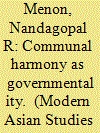

|
|
|
|
|
| Summary/Abstract |
Debates about secularism in post-independence India have often revolved around the visions of two of the country’s founding fathers—M.K.Gandhi and Jawaharlal Nehru. A sharp distinction is drawn between them by those who argue that the Gandhian model (or, what in common parlance and state discourses is called communal harmony) stems from Indian cultural and religious values, and lies beyond the realm of the state. The Nehruvian model, however, is a state project through and through. This article transcends this dichotomy to show that
the association of Nehru and Gandhi with these models does not necessarily mean that secularism and communal harmony faithfully reflect their ideas and, despite the differences in their aims and methods, both models are united in the discourses and practices of the state as strategies of ‘governmentality’. After redefining the core of communal harmony as reciprocity (rather than tolerance), I show how it is performed, how it supplements the state’s efforts to keep the peace in a religiously plural society by the force of law, and shores up the state’s
legitimacy deficit. However, the state’s simultaneous involvement in Nehruvian and Gandhian projects is not an innocuous fact because it undermines the state’s constitutional and secular obligations to non-discriminatory citizenship in the Indian nation. The argument is that the state’s endorsement of dargah-centred Islamic piety as an exemplary site of communal harmony and particular ideas of the Indian nation legitimized by communal harmony ‘problematizes’ the national belonging of certain kinds of pious Muslims.
|
|
|
|
|
|
|
|
|
|
|
|
|
|
|
|
| 5 |
ID:
120706


|
|
|
|
|
| Publication |
2013.
|
| Summary/Abstract |
Through close readings of recent fiction from English, Hindi and Kannada sources, this paper analyses the feminist ethic of care with reference to adult daughters caring for their critically-ill or dying mothers. The discussion focuses on problems associated with the care ethic and examines some of its assumptions, particularly its inability to account for the emotional complexity of adult caregiving relationships, which can make the invocation of relationality difficult; its focus on responsiveness to needs, such as those of helpless infants, which prevents adequate engagement with ideas of reciprocity; and, finally, its extraction of the caregiving relationship from the network of social and familial relationships in which it is embedded. Alongside my critique of the ethic of care, I will also examine the extent to which mainstream moral concepts, such as rights and contracts, may continue to be relevant to the dynamics of intergenerational relations in old age.
|
|
|
|
|
|
|
|
|
|
|
|
|
|
|
|
| 6 |
ID:
100035


|
|
|
|
|
| Publication |
2010.
|
| Summary/Abstract |
The moral perils believed to be associated with the giving and receiving of dan (giving) have been widely noted by anthropologists of South Asia. However, among these studies of Indian giving and exchange, less attention has been devoted to exploring how and why commercial transactions become a site of moral condemnation. Drawing upon twenty months of fieldwork with the boys who operated as commission agents or dalals in the foreign tourist economy in the city of Banaras, I demonstrate how the youths regarded these earnings as morally problematic. I argue that the various condemnations of dalali (commission) were symptomatic of a set of deeper concerns regarding the impact of foreign tourism, the future of the boys and their families, and ultimately the (re)production of the socio-cultural order itself. Furthermore, I argue that narratives about the dangers of dalali took on significance because they intersected with more pervasive, highly ambivalent reactions to modernity in India. As such, the conceptions of the dangers of dalali and danprovided people with a concrete way to address social changes that seemed at once overwhelming yet inchoate.
|
|
|
|
|
|
|
|
|
|
|
|
|
|
|
|
| 7 |
ID:
178373
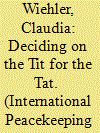

|
|
|
|
|
| Summary/Abstract |
Ceasefires are agreed in most intra-state conflicts and the majority of these agreements are violated. Yet, the subsequent dynamics of retaliation are still poorly understood. This article proposes a novel conceptual framework, describing the decision-making of conflict parties after ceasefire violations. I argue that the conflict parties face the two-fold decision-making problem of choosing a proportionate reaction: a reaction that assures their interest in the ongoing conflict and in the continuation of the agreement. When proportionate reactions are chosen, mutual compliance with the ceasefire can be re-established. The empirical implications of this framework are illustrated with evidence from two ceasefires in the Mindanao conflict in the Philippines. This article advances our analytical understanding of an overlooked period during armed conflict, i.e. while a ceasefire is in place. This is critical since collapsing ceasefires can lead to a deterioration of the humanitarian situation and of the prospects for peace. More generally, this article draws the attention to the counter-intuitive function of violence to secure cooperation in intra-state conflicts.
|
|
|
|
|
|
|
|
|
|
|
|
|
|
|
|
| 8 |
ID:
170173
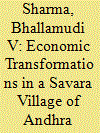

|
|
|
|
|
| Summary/Abstract |
Even tribal communities in India living in relative geographic isolation have experienced significant transformations during the last 70 years. Many studies have investigated the impact of tribal development programmes on the socio-economic conditions of different tribal communities. However, few attempts to systematically re-study the same tribal village after some decades have been made. This article re-examines the transformation of different sources of income for a Savara village in Andhra Pradesh and specifically scrutinises the impact of cashew plantations promoted in 1983–5. Since the acceptance to undertake cashew plantation was a precondition for the Savara of Manapuram to achieve economic and language integration, the question becomes what have been the results after some decades. The article identifies many consequences for this community, not just a shift from tamarind to cashew.
|
|
|
|
|
|
|
|
|
|
|
|
|
|
|
|
| 9 |
ID:
141815


|
|
|
|
|
| Summary/Abstract |
Behavioral economics has shown that people often diverge from classical assumptions about self-interested behavior: they have social preferences and are concerned about issues of fairness and reciprocity. Social psychologists show that these preferences vary across actors, with some displaying more prosocial value orientations than others. Integrating a laboratory bargaining experiment with original archival research on Anglo-French and Franco-German diplomacy during the interwar period, the authors show how fairness and reciprocity matter in social interactions. That prosocials do not exploit their bargaining leverage to the degree that proselfs do helps explain why some pairs of actors are better able to avoid bargaining failure than others. In the face of consistent egoism on the part of negotiating partners, however, prosocials engage in negative reciprocity and adopt the same behaviors as proselfs.
|
|
|
|
|
|
|
|
|
|
|
|
|
|
|
|
| 10 |
ID:
113810
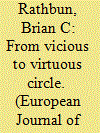

|
|
|
|
|
| Publication |
2012.
|
| Summary/Abstract |
Constructivists maintain that a shared identity was crucial for explaining the creation of the North Atlantic Treaty Organization and the multilateral form that it took. I challenge this view, arguing instead that the alliance was based on moralistic trust, the belief that others will live up to their moral obligations. Moralistic trust facilitates the initiation of cooperation, so that states can begin a virtuous circle of trust, collaboration, and enhanced trust. It is also the foundation of the diffuse reciprocity inherent to multilateralism. In two case studies of the domestic politics in the United States of making a multilateral security commitment to Europe, the first being the League of Nations, I demonstrate that identity was not a prominent consideration and did not lead individuals to embrace multilateralism. This social-psychological account improves upon constructivism and rationalism by offering a way to embed ideational variables in studies of strategic interaction.
|
|
|
|
|
|
|
|
|
|
|
|
|
|
|
|
| 11 |
ID:
180193
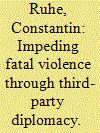

|
|
|
|
|
| Summary/Abstract |
Existing research provides no systematic insights into if and how mediation impedes battle-related deaths. Therefore, this article presents a temporally disaggregated analysis and assesses the effect of mediation on monthly fatal violence. The article predicts that adversaries evaluate opponents’ trustworthiness from both fighting and negotiation behavior. It argues that reducing fighting intensity during negotiations is a sign of cooperation, which can be negotiated by mediators to build trust. Over the course of mediation, the content of negotiations provides information about how genuinely a conflict party is interested in conflict resolution. Only if mediation achieves negotiation of core incompatibilities will conflict parties be willing to reduce fighting intensity. Under these conditions, information revealed in a mediation process can build trust and substantively reduce violence. An empirical analysis of all African conflicts between 1993 and 2007 supports this prediction and shows that on average mediation is followed by substantive and lasting reductions in fatal violence, if mediation discusses the conflict’s main incompatibility. In contrast, mediation on other topics is associated with a small, fleeting reduction in violence. Data of battle-related fatalities in Syria during negotiations as well as qualitative evidence further support the theoretical mechanism and the model prediction. The study concludes that mediation can reduce conflict intensity substantively, if it achieves exchange between conflict parties on the main conflict issues.
|
|
|
|
|
|
|
|
|
|
|
|
|
|
|
|
| 12 |
ID:
113257
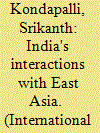

|
|
|
|
|
| Publication |
2010.
|
| Summary/Abstract |
India's relations with countries of East Asia reveal its growing profile in the region in economic, technological, diplomatic, political and military spheres. India's Look East policy, initiated in 1992, is bearing fruit now, as seen in the region becoming the largest trading partner of India, enhanced bilateral and multilateral diplomatic interactions, and long-term commitments in the security (maritime, cyber and space) fields. No doubt, relations between India and East Asia are acquiring depth as reflected in the broad-based interactions at the bilateral and multilateral levels as well as in trade, investments and people-to-people contacts in recent years. While Japan and both Koreas pose no major hurdle to India's foreign policy goal of garnering support for its basic cause of territorial integrity and sovereignty, the equation with China presents a very complicated picture. The apparent lack of insistence on the reciprocity principle by India in its dealings with China reflects the growing asymmetries in power between the two. As a result, India has been trying to enhance its defence cooperation with South Korea and Japan.
|
|
|
|
|
|
|
|
|
|
|
|
|
|
|
|
| 13 |
ID:
140449
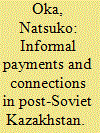

|
|
|
|
|
| Summary/Abstract |
In Soviet times, useful contacts had more value than money, and getting things done through unofficial channels of personal relations was a socially accepted norm. What changes have market reforms brought to Kazakhstan in these areas? This article details the use of informal payments and connections in Almaty and examines why non-monetary exchange of favours is increasingly being replaced by the immediate exchange of cash for assistance. This article argues that urban residents are becoming more inclined to quickly return a favour through cash and evade the lengthy exchanges involved in building reciprocal relationships, a practice widely accepted during Soviet times. This article also focuses on the importance of personal contacts in monetized exchange and demonstrates that cash payment is not a least preferred strategy for those who lack necessary networks. Urban residents in Kazakhstan in fact actively mobilize their personal networks to effectively and securely exchange monetary rewards.
|
|
|
|
|
|
|
|
|
|
|
|
|
|
|
|
| 14 |
ID:
130729
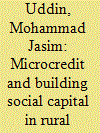

|
|
|
|
|
| Publication |
2014.
|
| Summary/Abstract |
In the 1990s, social capital and the group-based microcredit programme emerged as major planks of developmental interventions, and both approaches have underscored the necessity to mobilize social factors in the alleviation of poverty and social solidarity. The group-based microcredit model is considered an effective policy instrument for increasing women's access to financial capital and for strengthening their social capital at the local level. This study contributes to the continuing debate over how or if group-based microcredit facilitates to the formation of social capital at the local level in Bangladesh. Case studies and ethnographic (in-depth) interviews of 151 women microcredit borrowers of the Grameen Bank and the Bangladesh Rural Advancement Committee of Bangladesh were used in this study. The study suggests that the relationship between participation in the group-based microcredit programme and the facilitation of social capital at the local level is at best ambiguous. The assumed association between microcredit membership and building social capital (social networks, norms of reciprocity and collective identity and action) is much less prominent than commonly suggested by many previous scholars and development practitioners.
|
|
|
|
|
|
|
|
|
|
|
|
|
|
|
|
| 15 |
ID:
184143


|
|
|
|
|
| Summary/Abstract |
This article examines nalehmu, a set of informal relational practices for negotiating power across scales which have facilitated access and enforced accountability through mutually recognized norms and social sanctions in Myanmar. Like Asef Bayat’s “quiet encroachment” in the Middle East, nalehmu is Myanmar’s discreet and prolonged practice of agency that has enabled ordinary people to survive and better their lives despite the multiple ruptures in Myanmar’s history, as seen most recently in the February 2021 coup d’état. The paper analyzes how nalehmu serves as a hidden-in-plain-sight social infrastructure across three different scales: relations of mutuality, obligation, and reciprocity between individuals; implicit connections for accessing goods, services, and recognition; and a means of interacting with the state via the nalehmu economy. This analysis seeks to do more than add a different case to studies of urban Southeast Asia, but also to help produce further theorization that takes seriously the actually existing contexts and practices in the global South.
|
|
|
|
|
|
|
|
|
|
|
|
|
|
|
|
| 16 |
ID:
053835
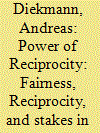

|
|
|
| 17 |
ID:
107979
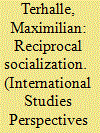

|
|
|
|
|
| Publication |
2011.
|
| Summary/Abstract |
This article asks how the international order can be renegotiated with rising powers. Negotiating understood as a process of socialization is the focus of the article. However, given non-Western states' recent practice of powerfully permeating the existing Western order, it is difficult to explain this process by means of neorealist, constructivist, or liberal socialization. Respectively, they presuppose that some states are already socialized while others need to be adopted into the club of socialized members. In contrast, this article suggests the notion of reciprocal socialization. It explains how rising powers are socialized into the order, while reshaping it when they enter. Two conditions need to be fulfilled to accomplish a socializing process that reflects the reciprocal influencing of states of the Western security community and non-Western veto-players; these are employing "small informal groups" and "personalized interactions." Their application can be viewed in informal operational rules which are, in turn, capable of governing the renegotiations.
|
|
|
|
|
|
|
|
|
|
|
|
|
|
|
|
| 18 |
ID:
143348


|
|
|
|
|
| Summary/Abstract |
There is accumulating evidence that decision makers (DMs) are sensitive to the distribution of resources among themselves and others, beyond what is expected from the predictions of narrow self-interest. These social preferences are typically conceptualized as being static and existing independently of information about the other people influenced by a DM’s allocation choices. In this article, we consider the reactivity of a DM’s social preferences in response to information about the intentions or past behavior of the person to be affected by the DM’s allocation choices (i.e., how do social preferences change in relation to the other’s type). This article offers a conceptual framework for characterizing the link between distributive preferences and reciprocity, and reports on experiments in which these two constructs are disentangled and the relation between the two is characterized.
|
|
|
|
|
|
|
|
|
|
|
|
|
|
|
|
| 19 |
ID:
182766
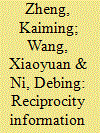

|
|
|
|
|
| Summary/Abstract |
This paper considers a modified principal-agent environment, where principals can use personalized offers based on agents' reciprocity-related information. With such information, principals can either impose stronger financial incentives or try to “trigger” agents' positive reciprocity by offering a higher fixed rate. Theory suggests that principals who believe in agents' reciprocity would personalize offers so that reciprocal agents increase their effort beyond the self-regarding benchmark. Using a lab experiment, we test the behavior of principals and agents. Our experimental market witnesses significant wage personalization when reciprocity information is available. However, agents' effort levels and principals' payoffs are lower under wage personalization, compared with the sessions where principals cannot personalize offers. Our structural analysis shows that, under wage personalization, agents expect higher fixed wages and reciprocate higher wages less. Information about agents' individual reciprocity is more correlated with the expected wages, rather than the strength of reciprocity toward higher or lower wages. Principals grant higher fixed wages to workers with lower wage expectations, but because principals cannot personalize offers effectively according to the strength of reciprocity, the performance of wage personalization is limited.
|
|
|
|
|
|
|
|
|
|
|
|
|
|
|
|
| 20 |
ID:
100994
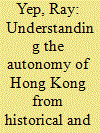

|
|
|
|
|
| Publication |
2010.
|
| Summary/Abstract |
The exercise of autonomy is a product of the political process of mutual learning by the center and the periphery. Propriety of action and response from both sides is not judged simply on the basis of formal legal permissibility, but is also deciphered with reference to experience in previous encounters. Earlier exchanges and responses to interactions create institutional memory, protocols for action, and limits to legitimate expectations. For both the Hong Kong Special Administrative Region and the central people's government, the new framework, through mutual adjustment and adaptation, is still in the process of being made. Their parallel experience in handling the central and local relationship can serve as a good basis for their exchanges. The articles included in this issue provide comparisons in temporal and spatial terms that are crucial for understanding the autonomy of Hong Kong after 1997. These contributions do not simply reconfirm the disposition of local players to defend and assert their interests vis-a-vis the center; the discussion here also identifies factors shaping the manifestation of autonomy in the case of Hong Kong. Trust, reciprocity, agenda of the sovereign power, and resolution of conflict appear to be significant in shaping the outcome of centre-periphery interaction.
|
|
|
|
|
|
|
|
|
|
|
|
|
|
|
|
|
|
|
|
|